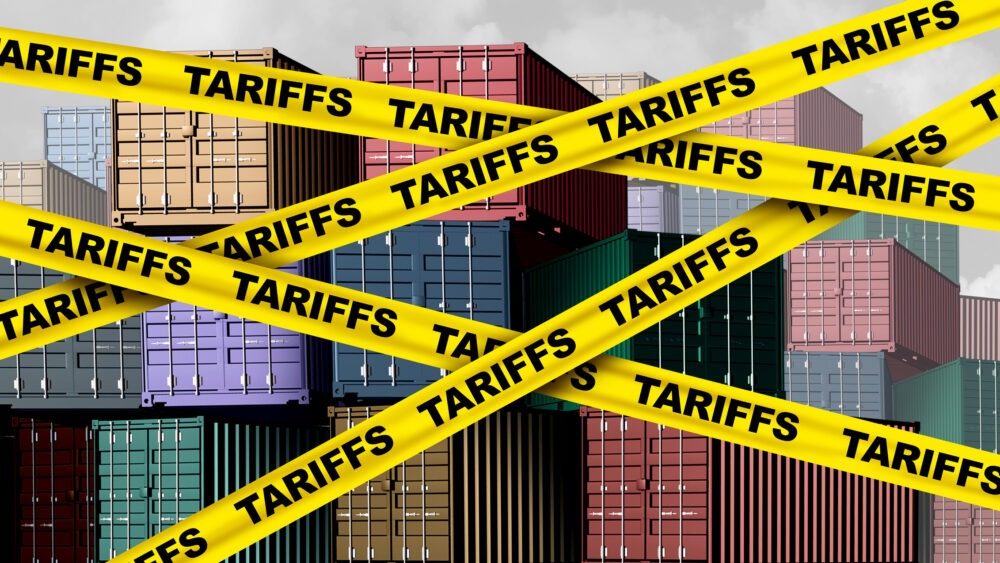How would you sum up the impact of the second Trump administration in a single word? Your view on that might depend on your political leanings. But across the spectrum, almost everyone would agree that this word would at least make the short list:
Tariffs.
Tariffs have been coming fast and furious for months now, shifting and changing from moment to moment with a swiftness that a chameleon would envy. Sometimes they’re on, sometimes they’re off. But they keep coming. Here’s a more-or-less current description of where the White House stands on tariffs, but if you want to be up to date, you should watch the latest news carefully.
And whatever else you think in general about levying a charge for other countries’ goods to come into our country, that very volatility causes nervousness among businesses everywhere, according to Douglas P. Woodward, economics professor and director of the Division of Research at the Darla Moore School of Business.
Uncertainty is a huge problem. Few things can impede a business’s ability to make decisions regarding growth and investment as much as not knowing whether today’s assumptions will hold true tomorrow. “They like certainty,” Woodward says of businesses everywhere. “How are they going to make a wise decision to invest a billion dollars based on a certain tariff when it might not exist tomorrow?”
This is especially true when tariffs as huge as these – 50 percent and more – are involved. Free-traders still speak with horror of the Smoot-Hawley Tariff of 1930, which at times grew to levels that high. But some of President Trump’s proposals go much higher. At one point in April, he proposed a 145 percent tariff on Chinese goods – and China threatened to charge 125 percent on American goods.
So, we have that dreaded thing, uncertainty, at an unprecedented level.
But volatility aside, Woodward wonders why the tariffs are called for at a time such as this, particularly from a South Carolina perspective.
Trump campaigned promising to revive the manufacturing that the Rust Belt had lost over the last generation or two, and that resonated well with many voters in the Midwest. He wielded tariffs as his main instrument for accomplishing that feat. But even if he could return those jobs to the Rust Belt – which is highly debatable – what good would his efforts do in the Palmetto State?
“In our state, we’ve had this strategy to bring in global investment, and look at what happened,” says Woodward. Especially in the Upstate, that’s been an excellent answer to the loss of the textile industry to other countries. Places like Greenville and Spartanburg “have done very well,” he notes. And beyond the Upstate, what good does it do anyone to inhibit the flow of goods in and out of the port of Charleston?
Even folks in areas that have not attracted such direct foreign investment as the BMW plant in Greer tend not to long for the textile industry’s demise. Woodward called attention to a recent story reported by The New York Times out of Union. The headline was “In South Carolina, a Once Thriving Textile Hub Is Baffled by Trump’s Tariffs.” Here’s an excerpt from an interview with former textile worker Adolphus Jones, 71:
By the end of the 1990s, automation and cheaper labor overseas took the industry away from the state. Union’s economy cratered, as did most of the region’s. But leaving Sunday church service on a recent afternoon, Mr. Jones, now 71 and retired, scoffed at President Trump’s vision of an American manufacturing revival through tariffs. The mill work had paid little, Mr. Jones recalled, and upward mobility was nonexistent.
“The textile industry is dead,” he said, buttoning his wool suit made in Italy. “Why would you want to bring it back here? Truthfully, why would the younger generation want to work there?”
That’s one man’s opinion, but Woodward notes that the overwhelming majority of American economists do not see the tariffs as good for South Carolina, the nation or the rest of the world. There are exceptions, of course, such as Trump’s top trade adviser, Peter Navarro, who was quoted in the NYT story, actually throwing shade on BMW in an interview with CNBC:
“…this business model where BMW and Mercedes come into Spartanburg, S.C., and have us assemble German engines and Austrian transmissions — that doesn’t work for America. It’s bad for our economics. It’s bad for our national security.”
“There was widespread bewilderment in our community about that,” said Carlos Phillips, the president and chief executive of the Greenville Chamber of Commerce.
And while a case can be made for tariffs, Woodward remains bewildered himself at this moment: “I’m not sure what the crisis is” that these measures are meant to address. Nor does he see how they will help our state or our country at this time.



Comments are closed.